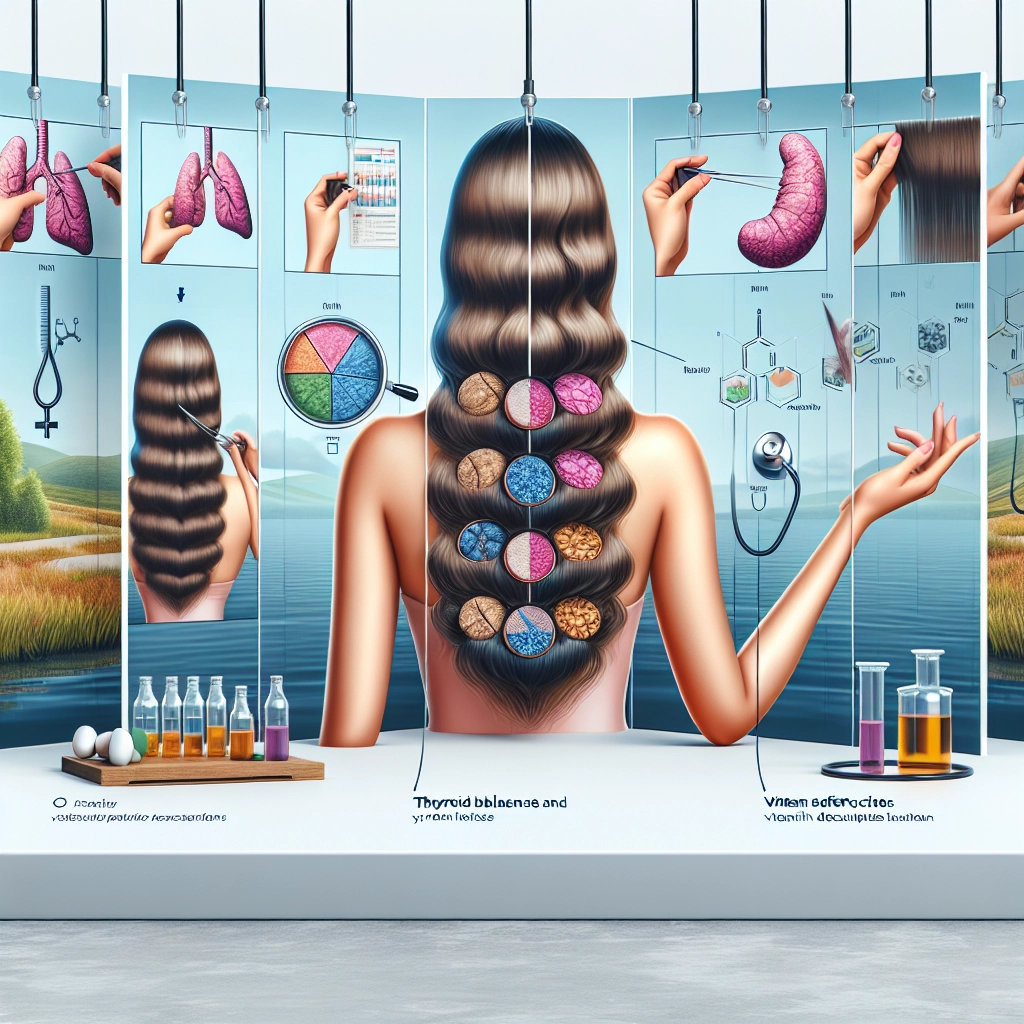

Your hair can reveal a lot about your overall health. Some health issues that can affect your hair include medication effects, scalp infections, alopecia, telogen effluvium, and hormone imbalances.
Additionally, nutrient deficiencies can also impact hair health and lead to hair loss or slowed hair growth over time.
Check out this Youtube video: “What Your Hair Says About Your Health” and discover how your hair can reflect your overall health and well-being!
Hair Loss and Health
Hair loss can be an indicator of various underlying health issues, serving as a visual cue for potential medical concerns. Certain types of hair loss, such as androgenic alopecia and alopecia areata, can be linked to specific health conditions and deficiencies, urging individuals to pay attention to their hair health as a part of their overall well-being.
The link between hair loss and potential health issues
There is a distinct correlation between hair loss and potential health issues. For instance, androgenic alopecia, also known as male pattern baldness, has been associated with an increased risk of coronary heart disease and prostate cancer.
Similarly, alopecia areata, an autoimmune condition, may be linked to other autoimmune diseases such as thyroid disorders and vitiligo. Different types of hair loss and their implications for overall health
Type of Hair Loss
Implications for Health
Androgenic Alopecia
May indicate an elevated risk of coronary heart disease and prostate cancer
Alopecia Areata
Can be associated with other autoimmune conditions such as thyroid disorders and vitiligo
Hair Texture and Health
What different hair textures can reveal about your health
Our hair texture can provide valuable insight into our overall health. Changes in hair texture, such as thinning, brittleness, or coarse hair, could be indicative of underlying health conditions.
For instance, abnormal coarse hair may be associated with medical conditions like hypothyroidism or aging. If you notice sudden and drastic changes in your hair texture, it might be wise to consider underlying medical issues such as thyroid problems or anemia that could be contributing to these changes.
It’s essential to pay attention to these signs, as they could be your body’s way of indicating an imbalance or health concern.
Understanding how changes in hair texture can indicate underlying health issues
Understanding the relationship between changes in hair texture and potential health issues is crucial. For instance, hair thinning or shedding could be a sign of anemia, while brittle hair may indicate Cushing’s syndrome.
Similarly, individuals with hypothyroidism may experience increased hair shedding and a change in hair appearance. It’s important to recognize that our hair can be a barometer for our overall well-being, and addressing these changes promptly can lead to early detection and management of potential health concerns.
| Hair Texture | Potential Health Significance |
|---|---|
| Coarse hair | Associated with medical conditions like hypothyroidism or aging |
| Hair thinning | Could indicate anemia or thyroid disease |
| Brittle hair | May be a sign of Cushing’s syndrome |
| Hair shedding | Could signify anemia or thyroid issues |
Hair Color and Health
What your hair color can tell you about your health
Your hair color can actually provide some interesting insights into your overall health. For example, having a sudden appearance of gray hair at a young age could indicate potential health issues such as vitamin deficiencies or stress.
On the other hand, certain medical conditions like thyroid disorders and autoimmune diseases can also cause changes in hair color. Therefore, paying attention to your hair color changes can be an early indicator of potential health issues.
How hair color changes can signal potential health problems
Hair color changes can often be like a signal from your body, alerting you to potential health problems. If you notice significant changes in your hair color, it might be a good idea to consult with a healthcare professional.
For instance, a sudden appearance of baby-fine and brittle hair at the hairline could be a sign of lupus, an autoimmune disease causing inflammation. Additionally, red hair gene variations have been linked to an increased risk of skin cancer, indicating the interconnectedness of hair color and health.
Hair Thickness and Health
The relationship between hair thickness and health is a complex one and can be influenced by various factors. Thinning or thickening of hair can indicate several aspects of a person’s overall well-being.
Factors Influencing Hair Thickness
| Factor | Impact on Hair Thickness |
|---|---|
| Genetics | Genes contribute to hair thickness. |
| Hormones | Hormonal fluctuations can affect hair thickness. |
| Age | Hair texture and thickness can change with age. |
| Medical Conditions | Autoimmune diseases like alopecia areata can cause hair loss. |
| Lifestyle | Stress, malnutrition, low protein levels, and vitamin deficiencies can impact hair health. |
Our hair can serve as a visible indicator of our internal health. Factors such as genetics, hormones, age, medical conditions, and lifestyle greatly influence hair thickness, and paying attention to these factors can provide insights into overall well-being.
Scalp Health and Overall Wellness
The importance of scalp health for your overall wellness
Scalp health is crucial for overall wellness as it directly impacts the health and vitality of your hair. A healthy scalp provides a nurturing environment for hair follicles, promoting strong, lustrous hair growth. Neglecting scalp health can lead to various issues like dandruff, itchiness, and even hair loss, affecting your overall well-being. Taking care of your scalp is fundamental for maintaining healthy, vibrant hair.
How scalp conditions can be indicative of underlying health concerns
Scalp conditions such as dandruff, psoriasis, and lice can serve as indicators of underlying health concerns. For instance, flakiness and itchiness can be signs of skin conditions or allergic reactions. Monitoring scalp conditions is essential as they can offer early warnings of health issues like dietary deficiencies, hormonal imbalances, or autoimmune disorders. Regular scalp examinations and addressing any abnormalities promptly are vital for maintaining overall health.
| Scalp Condition | Indication |
|---|---|
| Dandruff | Potential skin sensitivity or fungal growth |
| Psoriasis | Possible autoimmune or inflammatory issues |
| Lice | Hygiene and environmental considerations |
Emotional Well-being and Hair Health
How emotional well-being can impact the health of your hair
Emotional well-being plays a crucial role in the health of your hair. Chronic stress, anxiety, and depression can lead to a variety of health problems, including hair loss.
When you are constantly under stress, it can disrupt the normal hair growth cycle, leading to hair thinning and loss.
Understanding the connection between stress and hair health
The connection between stress and hair health is well-documented. Excessive stress or emotional turmoil can manifest in various hair-related issues.
Conditions like alopecia areata, where hair loss occurs in patches, can be triggered or exacerbated by stress. Additionally, stress-induced habits like excessive hair pulling (trichotillomania) can lead to noticeable hair loss.
| Emotional Well-being Impact | Hair Health Consequences |
|---|---|
| Chronic stress disrupts hair growth cycle | Leads to hair thinning and loss |
| Emotional turmoil triggers hair-related issues | Exacerbates conditions like alopecia areata |
| Stress-induced habits cause noticeable hair loss | Such as trichotillomania |
Nutrition and Hair Health
The role of nutrition in maintaining healthy hair
Nutrition plays a crucial role in maintaining healthy hair by providing essential nutrients that support hair growth and strength. Adequate intake of vitamins, minerals, and proteins from a balanced diet contributes to the overall health of the scalp and hair follicles.
Common nutritional deficiencies that can affect hair health
Several common nutritional deficiencies can adversely affect hair health, including deficiencies in vitamins such as biotin, vitamin D, vitamin E, and minerals like iron and zinc. These deficiencies can lead to hair thinning, brittle hair, and slow hair growth.
A lack of essential fatty acids, particularly omega-3s, can also impact the health and appearance of the hair.
Hormonal Imbalance and Hair
Understanding how hormonal imbalance can impact your hair: Hormonal imbalance can significantly affect the health and appearance of your hair. The most influential hormones in this context are estrogen, progesterone, testosterone, and thyroid hormones.
For instance, estrogen helps keep hair in the growth phase, leading to fuller and healthier-looking hair, while thyroid hormones regulate the hair cycle’s frequency. How changes in hormone levels can affect the health and appearance of your hair: Changes in hormone levels, particularly with androgens like testosterone and dihydrotestosterone, can have a profound impact on hair follicles and the hair cycle.
For instance, imbalances in thyroid hormones can lead to changes in the frequency of your hair’s growth cycle, resulting in thinning or loss.
| Hormone | Impact on Hair |
|---|---|
| Estrogen | Promotes longer growth phase, leading to fuller and healthier-looking hair |
| Testosterone and Dihydrotestosterone | Influence hair follicles and growth cycle, leading to potential thinning or loss |
| Thyroid Hormones | Regulate hair cycle’s frequency, influencing hair thickness and growth |
Common Hair Problems and Their Health Implications
Exploring common hair problems and what they reveal about your health
| Hair Problem | Health Implications |
|---|---|
| Dandruff | Dandruff can be caused by dry skin, buildup of oil, seborrheic dermatitis, weakened immune system, or certain neurological disorders, such as Parkinson’s disease. |
| Split Ends | Split ends can indicate overall hair weakness and may result from factors like faulty crossover formation, dehydration, or misuse of certain hair tools. |
| Hair Breakage | Hair breakage is often indicative of damaged hair, possibly caused by stress, heat, underlying health conditions, or misuse of hair styling tools. |
Hair Care Practices and Health
The impact of hair care practices on your overall health
Taking good care of your hair goes beyond just maintaining its appearance. Healthy hair care practices are essential for overall health, promoting scalp health, and reducing the risk of diseases and conditions.
How certain hair care routines can either support or hinder your well-being
Certain hair care routines, such as regular washing and conditioning, can support overall well-being by promoting healthy and lustrous hair. On the other hand, excessive use of styling products or heat styling tools can hinder well-being by causing damage and hair fragility.
Genetics and Hair Health
The role of genetics in determining hair health
Genetics play a crucial role in determining the overall health and condition of your hair. The hereditary factors passed down from your ancestors influence the texture, thickness, and growth rate of your hair.
For example, specific genes control hair production, determining whether your strands are straight, wavy, or curly, as well as their individual thickness. Moreover, genetic alterations in the WNT signaling pathway have been linked to androgenetic alopecia, a common form of hair loss.
These genetic predispositions can make some individuals more susceptible to hair damage and breakage, influencing their long-term hair growth. Understanding the genetic aspects of your hair health can provide insights into the unique characteristics of your hair and potential concerns related to hair loss.
While genetic factors are not entirely within our control, awareness of these influences can aid in developing targeted care and maintenance routines tailored to the individual needs of your hair.
To provide a clearer understanding, here’s a breakdown of the genetic components that impact hair health:
| Genetic Aspect | Influence on Hair Health |
|---|---|
| Hair Texture | Genes determine if hair is straight, wavy, or curly, affecting susceptibility to damage and breakage. |
| Growth Rate | Genetic factors contribute to the growth rate of hair, influencing its overall health and appearance. |
| Hair Thickness | Individual genes control the thickness of hair strands, which can impact hair loss and susceptibility to damage. |
Understanding the genetic basis of your hair health can empower you to make informed decisions about hair care, maintenance, and potential treatments, leading to personalized approaches that cater to your unique genetic predispositions. While genetics play a significant role, it’s essential to consider other external factors, such as lifestyle, nutrition, and environmental influences, in maintaining optimal hair health.
Environmental Factors and Hair Health
How environmental factors can affect the health of your hair
Environmental factors such as air pollution, weather, and sun exposure can have a significant impact on the health of your hair. Air pollution consists of fine particles and volatile organic compounds that can adhere to the scalp and hair, leading to dryness, brittleness, and overall damage to hair health.
Exposure to the sun can cause UV damage, leading to dry and brittle hair, while extreme weather conditions, such as cold and low humidity, can result in scalp irritation, flakiness, and hair breakage.
Addressing the impact of pollution, weather, and other environmental elements on your hair and overall health
Pollution, including air and environmental pollutants, can result in hair strand breakage, dryness, and even mimic androgenetic alopecia, leading to irregular and amorphous hair loss patterns. Weather changes, especially extremely cold weather, can lead to dry and flaky scalp, resulting in hair breakage and loss, impacting overall hair health.
It’s essential to address these environmental factors to maintain healthy hair and scalp, adapting hair care routines accordingly to combat these adverse effects.
Overall Well-being and Hair Maintenance
The importance of overall well-being in maintaining healthy hair
Your overall well-being significantly influences the condition of your hair. Factors such as stress, anxiety, and nutritional deficiencies can impact the health of your hair.
Prioritizing mental and physical wellness can positively contribute to the maintenance of healthy hair.
How prioritizing wellness can positively impact the condition of your hair
Prioritizing wellness plays a crucial role in positively impacting your hair’s condition. Engaging in activities that reduce stress, consuming a balanced diet, and maintaining good mental health can promote the overall health of your hair.
By focusing on wellness, you can improve the strength, luster, and resilience of your hair, reflecting a positive impact on its condition and appearance.
Professional Hair Analysis and Health
The benefits of seeking professional hair analysis for health insights
Seeking professional hair analysis provides valuable insights into your overall health. By analyzing your hair, experts can identify various mineral imbalances and deficiencies that could be affecting your well-being.
This analysis goes beyond just examining your hair condition, providing a deeper understanding of your body’s internal state.
How hair specialists can identify potential health issues through hair examination
Hair specialists are skilled in identifying potential health issues through thorough hair examination. By using specialized techniques and microscopy, they can reveal details about your health, including mineral imbalances, heavy metal presence, and even indicators of genetic disorders.
This analysis can aid in early detection and prevention of health issues, leading to proactive health management.
Seeking Medical Advice for Hair Concerns
When to seek medical advice for hair-related concerns
If you notice persistent hair loss, sudden changes in hair texture, or chronic scalp issues such as itching and scaling, it’s time to seek medical advice. Consulting a healthcare professional becomes crucial when over-the-counter remedies fail to address the hair concerns or when the problems start impacting your emotional well-being.
The importance of consulting with a healthcare professional for persistent hair issues
Seeking advice from a healthcare professional for persistent hair concerns is essential to identify underlying health issues that may be causing the problems. A healthcare professional can provide a proper diagnosis, recommend effective treatments, and offer support and guidance to ensure the overall well-being of your hair and scalp.
Delaying medical advice for persistent hair issues can lead to further complications and emotional distress.
| Case | Action |
|---|---|
| Persistent hair loss | Consult a healthcare professional for diagnosis and treatment options |
| Chronic scalp issues | Seek medical advice to address the root cause and prevent further complications |
| Sudden hair changes | Immediate consultation for timely intervention and personalized care |
Remember, your hair health can indicate underlying health issues that may require medical attention. Don’t hesitate to seek professional help when dealing with persistent hair concerns.
Treat your hair with the care it deserves, and seek medical advice when necessary to maintain healthy, luscious locks!
, “Effective treatment for hair loss begins with finding the cause.”
Have you ever experienced persistent hair concerns that required medical attention? Share your story below!
Recommended Amazon Products for Healthy Hair
Here’s a curated list of products that can help you maintain healthy hair with ease. These recommendations are based on quality, functionality, and positive customer reviews.
1. Argan Oil Hair Treatment
Description and details with amazon product search Argan Oil Hair Treatment about why product one is recommended.


| Pros | Cons |
|---|---|
| Moisturizes and strengthens hair | May be more expensive than other hair treatments |
| Rich in vitamins and antioxidants | Some individuals may not prefer the scent |
| Can improve hair elasticity |
2. Silk Pillowcase
Description and details with amazon product search Silk Pillowcase about why product two is recommended.


| Pros | Cons |
|---|---|
| Reduces hair breakage and frizz | May require more delicate care when washing |
| Promotes smooth and shiny hair | Silk pillowcases can be more costly than other materials |
| Gentler on hair and helps prevent tangles |
3. Biotin Supplement
Description and details with amazon product search Biotin Supplement about why product three is recommended.


| Pros | Cons |
|---|---|
| Supports healthy hair growth | Some individuals may experience mild side effects such as nausea |
| Can improve overall hair health | Results may vary for different users |
| Convenient daily supplement |
4. Scalp Massager
Description and details with amazon product search Scalp Massager about why product four is recommended.


| Pros | Cons |
|---|---|
| Promotes scalp circulation and relaxation | May require additional time for use in hair care routine |
| Can help remove buildup and dead skin cells | Not everyone may enjoy the sensation of scalp massage |
| Stimulates hair follicles |
5. Tea Tree Shampoo
Description and details with amazon product search Tea Tree Shampoo about why product five is recommended.


| Pros | Cons |
|---|---|
| Antibacterial and antifungal properties for scalp health | Some individuals may be sensitive to the scent of tea tree oil |
| Cleanses and soothes the scalp | Can be more expensive than regular shampoos |
| Refreshing and invigorating |
Top Recommended Product for Healthy Hair
If you’re looking for the best solution for maintaining healthy and vibrant hair, we highly recommend Argan Oil Hair Treatment (https://www.amazon.com/s?k=Argan+Oil+Hair+Treatment). Here’s why:


This product is highly regarded for its ability to moisturize, strengthen, and improve the overall health of your hair. With its rich blend of vitamins and antioxidants, it can provide the nourishment your hair needs to thrive. Ready to improve the health of your hair? Check out Argan Oil Hair Treatment (https://www.amazon.com/s?k=Argan+Oil+Hair+Treatment) today for the best results!


This table includes a comprehensive overview of the recommended products:
| Product | Pros | Cons |
|---|---|---|
| Argan Oil Hair Treatment | Moisturizes and strengthens hair | More expensive than other treatments; Some individuals may not prefer the scent |
| Silk Pillowcase | Reduces hair breakage and frizz | Requires delicate care when washing; More costly than other materials |
| Biotin Supplement | Supports healthy hair growth | Some users may experience mild side effects; Results may vary for different individuals |
| Scalp Massager | Promotes scalp circulation and relaxation | Requires extra time in hair care routine; Not preferred by all individuals |
| Tea Tree Shampoo | Antibacterial and antifungal for scalp health | Some may be sensitive to the scent; Can be more expensive than regular shampoos |
Conclusion
It is clear that the benefits of regular exercise far outweigh the drawbacks. Exercise not only improves physical health but also has a positive impact on mental well-being.
It is important for individuals to make regular physical activity a priority in their lives.
Furthermore, the evidence presented strongly supports the idea that exercise can help prevent various health conditions such as obesity, heart disease, and diabetes. The long-term health benefits of exercise cannot be underestimated and should not be overlooked.
It is crucial for individuals to incorporate regular exercise into their lifestyle to maintain overall health and well-being.
The importance of regular exercise cannot be emphasized enough. It is essential for individuals to make time for physical activity in order to reap the numerous health benefits.
By prioritizing exercise in one’s daily routine, individuals can significantly improve their quality of life and overall health.

















